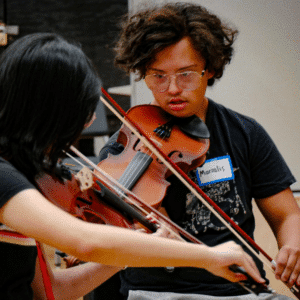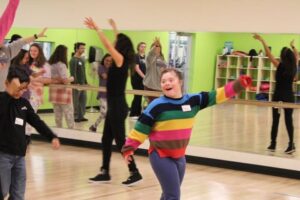Adaptive arts, which refer to art forms and activities that are tailored to accommodate individuals with varying abilities and needs, offer numerous benefits for children. These benefits can extend to children with disabilities, neurodiverse traits, or other unique circumstances. Here are some of the key advantages of adaptive arts for children:
- Inclusivity and Participation: Adaptive arts programs create an inclusive environment where children of all abilities can participate and express themselves. This promotes a sense of belonging and community, helping children feel valued and respected.
- Enhanced Communication: For children who may struggle with traditional communication methods, adaptive arts provide an alternative means of self-expression. Through visual arts, music, dance, or other creative activities, children can communicate their thoughts, emotions, and ideas more effectively.
- Motor Skill Development: Adaptive arts activities can be designed to support the development of fine and gross motor skills. Engaging in activities like painting, sculpting, or playing musical instruments can help children improve their coordination, dexterity, and muscle control.
- Sensory Integration: Many children with sensory processing challenges benefit from adaptive arts activities that engage their senses in controlled and enjoyable ways. These activities can help children better process sensory input, leading to improved self-regulation and overall sensory integration.
- Emotional Regulation: Engaging in creative arts can serve as a therapeutic outlet for children to express and regulate their emotions. Artistic activities provide a safe space for children to explore and process their feelings, reducing stress and anxiety.
- Boosted Self-Esteem: Adaptive arts programs focus on each child’s unique strengths and abilities, fostering a sense of accomplishment and pride. As children see their creations take shape and receive positive feedback, their self-esteem and confidence can significantly improve.
- Cognitive Development: Artistic activities stimulate cognitive processes such as problem-solving, critical thinking, and imaginative exploration. Through adaptive arts, children can enhance their cognitive skills while enjoying a fun and engaging experience.
- Social Interaction: Adaptive arts programs often involve group activities, which can improve social skills and peer interactions. Children can work collaboratively, share ideas, and learn from one another in a supportive environment.
- Cultural Awareness: Exposure to various art forms can introduce children to different cultures, traditions, and ways of thinking. This exposure promotes empathy, tolerance, and a broader understanding of the world around them.
- Creative Thinking: Engaging in adaptive arts encourages children to think outside the box, develop their creativity, and embrace their individuality. This skill set can benefit them across various aspects of life and learning.
- Personalized Learning: Adaptive arts programs can be tailored to the specific needs and preferences of each child. This personalized approach allows for more effective and engaging learning experiences.
- Parent and Caregiver Engagement: Adaptive arts activities can be enjoyed by children and their parents or caregivers together. This shared experience can strengthen relationships, create lasting memories, and foster a deeper understanding of each child’s abilities.
In summary, adaptive arts provide children with a wide range of physical, emotional, cognitive, and social benefits. By tailoring creative experiences to individual abilities and needs, adaptive arts programs empower children to explore their potential, express themselves, and enjoy the many rewards of artistic engagement.
You can help support Children’s Clinics adaptive recreation programs which include theatre, improv, rock orchestra, and dance. These programs are not covered by insurance, but we believe they are vital to a child’s health and well-being. Please support these programs by donating today!




